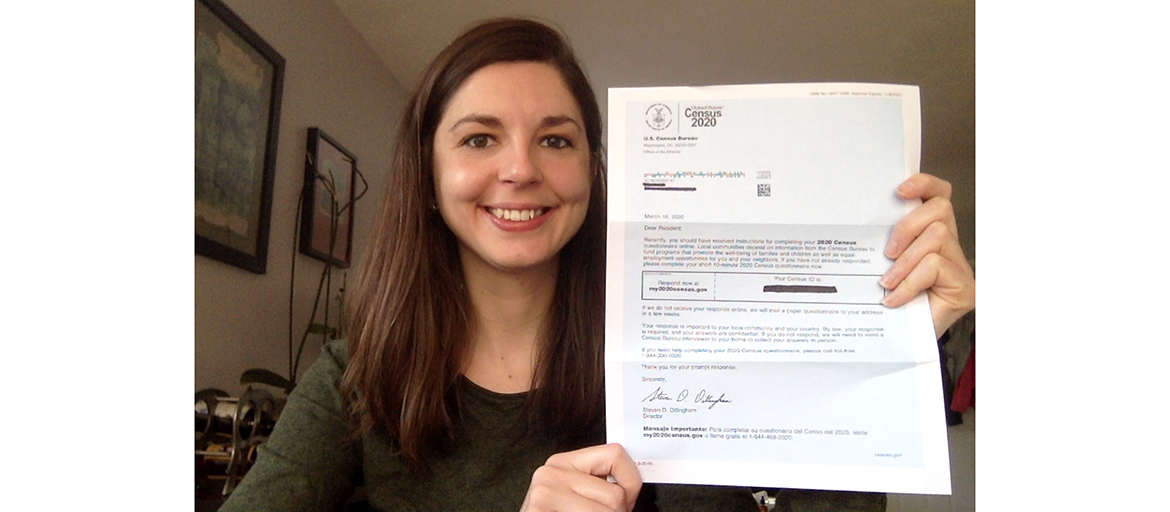April 20, 2020 update to this story: The “Politics of Counting” course (Political Science 374) will be offered this summer – still relevant with the change of census operation and deadlines due to COVID-19. To see the course description, go to UNC Asheville’s course schedule page and select Summer 2020 in the upper left).
****************************************************************************************
First the positive: For the first time in U.S Census history, you can fill in your form online, staying home and staying safe. You probably have already gotten a code number in the mail from the Census Bureau, and when you fill out the survey, April 1 will be the key date – ‘who lives at this address on April 1?’
Now the negative: COVID-19 may make it extremely difficult to avoid undercounting in our state and region, especially among some of our most vulnerable people – those most in need of government programs with funding that is distributed according to the census count.
“This is a real challenge for the Census Bureau,” according to UNC Asheville Assistant Professor of Political Science, Ashley Moraguez. “There’s so much on the line, but it’s a horrible time to be doing outreach in the community right now.”
Additionally, while roughly half of the states in the U.S. promote the census, trying to get residents to be counted, North Carolina does not – it has not allocated any state funds for census outreach according to Moraguez. And as of March 30, North Carolina ranked 39th among states, with just a 30% participation rate. Buncombe is in the lower half of our state’s counties in terms of census participation, with only 28.5% having self-reported thus far.
Self-reporting will continue through the end of May, and Moraguez and the students in her Census 2020: The Politics of Counting class are passionate about getting everyone in Western North Carolina counted. “It’s a way to bring your federal tax money back to our community, and to make sure you have the amount of representation you deserve in the Congress and state legislature,” said Moraguez. And the census only happens once a decade – the impact of undercounting any segment of our population will be felt for a full 10 years.
Students Take Up the Challenge
Before the spread of COVID-19 reached North Carolina, Moraguez’s students together with students in a U.S. ethnic studies course taught by Assistant Professor Anne Jansen, were all set to share their passion, and everything they’ve learned about census issues, in a public symposium on March 24. Issues of racial and ethnic identity, citizenship, gerrymandering and more as applied to the census were all on the agenda, and Census Bureau officials and community experts were going to join in.
Instead, the students will now have to present virtually, doing their best to raise awareness and enthusiasm about the census in the coming weeks.
“We had already had a meeting with a Census Bureau representative who requested that we create memes about the census, and the students came up with some clever ones that will appeal to the younger demographic which also is harder-to-count. We have five students who speak Spanish so we’ll have English and Spanish posts, but unfortunately, not other languages,” said Moraguez.
Creating the public symposium was part of the course’s service-learning requirement. “But in the new social distancing environment, part of their service will be to go on social media and blast out why it’s so important to respond to the census and what’s at stake,” Moraguez said. “The problem is that there are only select populations that use social media, so we’re not going to reach everyone and that is a severe limitation. But this is the one way available to try and help.
“Additionally, the students all applied for jobs with the census to be enumerators, or ‘door-knockers’ who go into the community to count those who haven’t self-reported to the census. Of course, applications have been withdrawn because that door-knocking is on hold here due to the virus and the students are dispersed to home communities. The door knocking was scheduled to take place from April through July. Then the Census Bureau begins to process all that data. By law, the Census Bureau is supposed present the president with the total population count and the new apportionment of seats for the House of Representatives to the states by the end of the calendar year,” said Moraguez.
“There is a concern that if they stick with their deadline and the virus prevents a lot of door-knocking, there is going to be a significant population that’s not counted,” she said. People in poverty, racial and ethnic minorities, people whose first language is not English, and the homeless are among the many groups less likely to respond to a census form in the mail. “That would have huge implications because the populations that are less likely to self-respond are the ones that tend to be the most vulnerable in society and who most need certain programs that are funded according to the census. If they’re not counted, the communities where they live will find those programs under-funded,” said Moraguez.
What’s at Stake
“For every individual that’s counted in Buncombe County, that’s worth about $1,600 annually in federal funding for the state and local government, and over 10 years, that’s a lot of money,” she said. “So if we’re undercounted even by 1,000 or 2,000 people, we’re talking about big money that can affect funding for infrastructure – better roads, water system, education funding, affordable housing and food stamps. The census can even drive where hospitals are located based on population density. And the census determines how much representation we have in federal and state government.”
So, go to 2020census.gov or look through your pile of mail for that census form, and in coming weeks, look on Facebook for “Bulldogs Count for the 2020 Census,” and on Instagram, @bulldogscount.
 Ashley Moraguez
Ashley Moraguez
Share
Permalink: